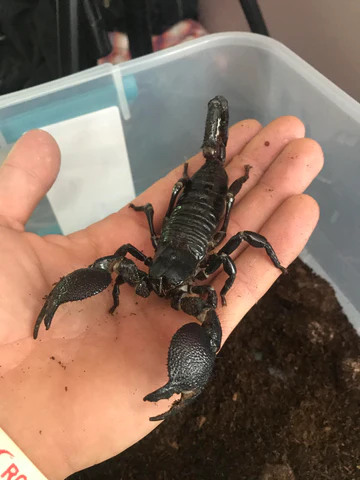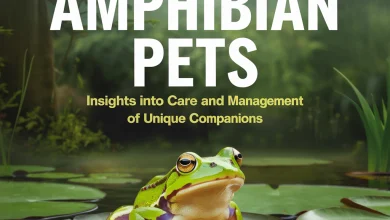Scorpions as Pets: A Unique and Fascinating Companion

Scorpions are among the most intriguing and exotic pets one can own. While they may not offer the cuddly companionship of traditional pets, they make up for it with their fascinating behavior, unique appearance, and relatively low-maintenance care. If you’re considering keeping a scorpion as a pet, here’s what you need to know about their care, habitat, and what makes them such fascinating creatures to observe.
1. Why Scorpions Make Interesting Pets
Scorpions are often sought after by enthusiasts who enjoy keeping exotic pets. Here’s why they can make interesting companions:
- Low Maintenance: Scorpions don’t require a lot of attention or maintenance. Once you’ve set up their enclosure properly, they need very little in the way of daily care.
- Quiet and Solitary: Unlike many pets, scorpions are solitary creatures that prefer to live alone. They don’t need social interaction or regular handling, making them ideal for owners who want a pet that can be admired from a distance.
- Fascinating Behavior: Scorpions are nocturnal hunters, and their behavior is captivating to observe. From their unique hunting style to their ability to glow under UV light, they offer a truly one-of-a-kind experience for pet owners.
- Long Lifespan: With proper care, some species of scorpions can live for up to 6-8 years, providing a long-term companion for enthusiasts.
2. Choosing the Right Species of Scorpion
There are several species of scorpions kept as pets, each with its own temperament and care requirements. Some of the most popular pet scorpion species include:
- Emperor Scorpion (Pandinus imperator): One of the largest and most commonly kept scorpions, the emperor scorpion is known for its relatively mild temperament. They are black in color and can reach up to 8 inches in length.
- Asian Forest Scorpion (Heterometrus spp.): Similar in appearance to the emperor scorpion, this species is more aggressive but still popular among enthusiasts. They prefer humid environments.
- Desert Hairy Scorpion (Hadrurus arizonensis): This species is native to desert environments and is known for its light yellow color and large size. It requires a dry, arid habitat.
- Bark Scorpions (Centruroides spp.): These are smaller scorpions, typically more venomous, and best suited for experienced scorpion keepers.
When selecting a scorpion, beginners should opt for a less venomous species like the emperor scorpion, which is more docile and easier to handle.
3. Setting Up a Scorpion Enclosure
A proper enclosure is essential for the health and comfort of your pet scorpion. Here’s what you’ll need:
- Tank Size: A 10-gallon glass tank is suitable for most scorpions. Make sure the tank has a secure lid, as scorpions are excellent climbers and could escape.
- Substrate: Depending on the species, choose a substrate that mimics their natural environment. For tropical species like the emperor scorpion, use a substrate like coconut fiber or soil to maintain humidity. For desert species, sand is ideal.
- Humidity and Temperature: Tropical species require a humid environment with a humidity level of 70-80%, while desert species prefer dry conditions. Use a heat lamp or heating pad to maintain the temperature between 75-90°F.
- Hiding Places: Scorpions love to hide, so provide plenty of hiding spots using rocks, logs, or commercial hides. This helps them feel safe and reduces stress.
- Water: Provide a shallow dish of water that is easy for your scorpion to access. While they don’t drink often, they do need access to water for hydration.
4. Feeding Your Pet Scorpion
Scorpions are carnivorous and primarily feed on live prey. Here’s how to feed them:
- Diet: Feed your scorpion a diet of crickets, mealworms, or roaches. Younger scorpions may require smaller prey, while adults can handle larger insects.
- Feeding Frequency: Adult scorpions only need to eat once or twice a week. They are slow digesters and don’t need to be fed daily. Juveniles may require more frequent feedings.
- Hunting: Scorpions are nocturnal hunters, so it’s best to feed them in the evening. Drop live prey into their enclosure and watch as your scorpion uses its pincers and stinger to subdue the prey.
- Water: Scorpions don’t drink a lot of water, but ensure their water dish is always clean and filled.
5. Handling and Safety Considerations
While some scorpions can be handled with care, it’s generally not recommended, especially for beginners. Here are some safety tips:
- Minimal Handling: Scorpions are not pets that enjoy being handled, and doing so can cause them stress. If handling is necessary (e.g., for cleaning the enclosure), use long tongs or tweezers to move them.
- Venom and Stings: All scorpions are venomous, but the potency varies by species. While an emperor scorpion’s sting is comparable to a bee sting, other species can deliver more painful or dangerous stings. Always be cautious and avoid direct contact with your scorpion.
- UV Light: Scorpions have a unique trait – they glow under UV light! This can be a fun way to observe them in a new light, literally.
6. Common Health Issues in Scorpions
Scorpions are hardy creatures, but they can still experience health issues if not properly cared for. Here’s what to watch out for:
- Dehydration: Ensure your scorpion has access to water and a humid environment (if needed) to prevent dehydration, which can lead to lethargy and poor health.
- Mites and Parasites: Scorpions can sometimes suffer from mites, which are tiny parasites that feed on their blood. If you notice small, white specks moving on your scorpion, consult a vet experienced with exotic pets.
- Molting Problems: Scorpions shed their exoskeleton as they grow in a process called molting. Ensure proper humidity levels to aid in a smooth molt. If the enclosure is too dry, your scorpion may have difficulty molting, which can be fatal.
7. Fun Facts About Scorpions
- Ancient Creatures: Scorpions have been around for over 400 million years, making them one of the oldest creatures on Earth.
- Glow in the Dark: Scorpions fluoresce under ultraviolet light due to chemicals in their exoskeleton. This is one of their most unique and fascinating traits.
- Venomous Tail: Scorpions use their venomous sting primarily to subdue prey, but they will also use it in self-defense when threatened.
- Multiple Offspring: Female scorpions give birth to live young, which ride on their mother’s back for protection until they are ready to venture out on their own.
Conclusion
Scorpions may not be the cuddliest of pets, but they offer a unique and rewarding experience for those who enjoy observing exotic creatures. Their low-maintenance nature, fascinating behavior, and ancient lineage make them a captivating pet for the right owner. With the proper care, a well-designed habitat, and a bit of patience, your pet scorpion can thrive and provide you with years of intrigue.



